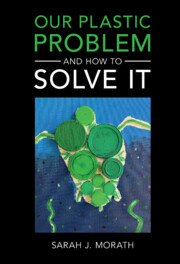Book contents
- Our Plastic Problem and How to Solve It
- Our Plastic Problem and How to Solve It
- Copyright page
- Contents
- Acknowledgments
- Abbreviations
- Introduction
- Part I Plastic in the Environment
- Part II Multimodal Approaches to Solving Our Plastic Problem
- Part III Innovation and Design
- 8 Plastic Alternatives
- 9 Plastic’s End
- 10 The Circular Economy
- Index
8 - Plastic Alternatives
Bioplastics and Material Replacement
from Part III - Innovation and Design
Published online by Cambridge University Press: 17 March 2022
- Our Plastic Problem and How to Solve It
- Our Plastic Problem and How to Solve It
- Copyright page
- Contents
- Acknowledgments
- Abbreviations
- Introduction
- Part I Plastic in the Environment
- Part II Multimodal Approaches to Solving Our Plastic Problem
- Part III Innovation and Design
- 8 Plastic Alternatives
- 9 Plastic’s End
- 10 The Circular Economy
- Index
Summary
Chapter 8 discusses the use of bioplastics as an alternative to petroleum-based plastics. Bioplastics are plant-based, and are either made from the sugars, like those in corn, or produced by microbes. Proponents of bioplastics argue that bioplastics use fewer fossil fuel resources, have a smaller carbon footprint, and decompose faster that petroleum-based plastics. Bioplastics are also less toxic and do not contain bisphenol A (BPA), a hormone disrupter that is often found in traditional plastics.
Bioplastics, however, require high temperatures to biodegrade, and few cities have the infrastructure necessary to assist in the biodegradation of these plastics. Bioplastics can also contaminate recyclable plastics, thereby necessitation two separate recycling streams – one stream for bioplastics and another for petroleum-based plastics. In addition, many bioplastics still require resources like land and water to grow the raw biomaterials.
Nonetheless, as concerns over traditional plastic grow, bioplastics have received greater attention. And while the market for bioplastics is expected to increase by 20% by 2025, given the low price of crude oil, there is currently little economic incentive to switch to plant-based raw materials. While bioplastics are worth pursuing, Chapter 8 concludes that shifting to bioplastics, alone, will not solve our plastic problem. Thus, innovations in bioplastics should be pursued alongside regulatory and private measures.
Keywords
- Type
- Chapter
- Information
- Our Plastic Problem and How to Solve It , pp. 161 - 170Publisher: Cambridge University PressPrint publication year: 2022



